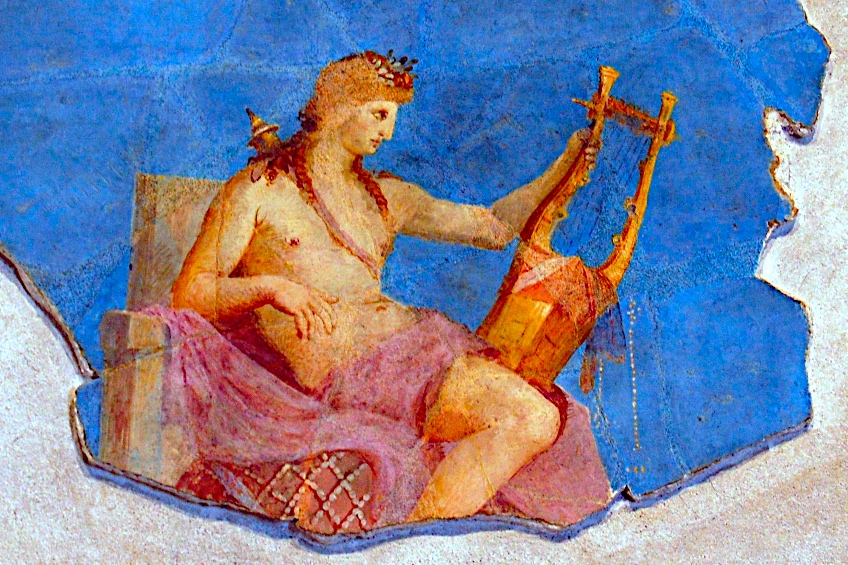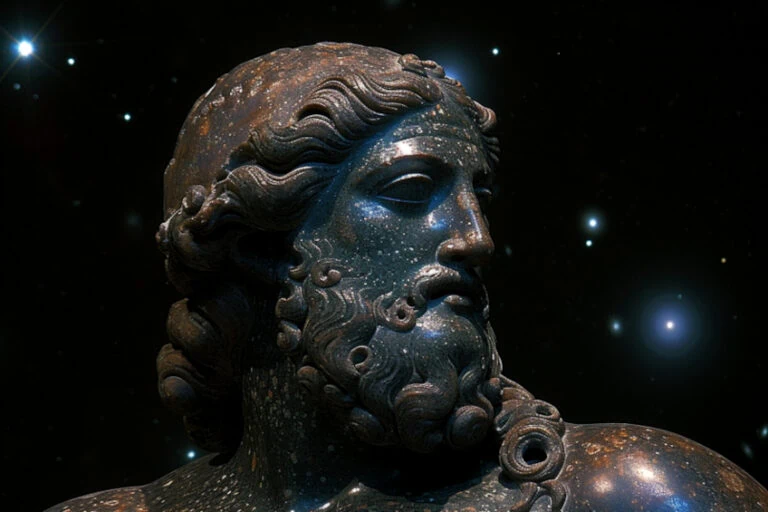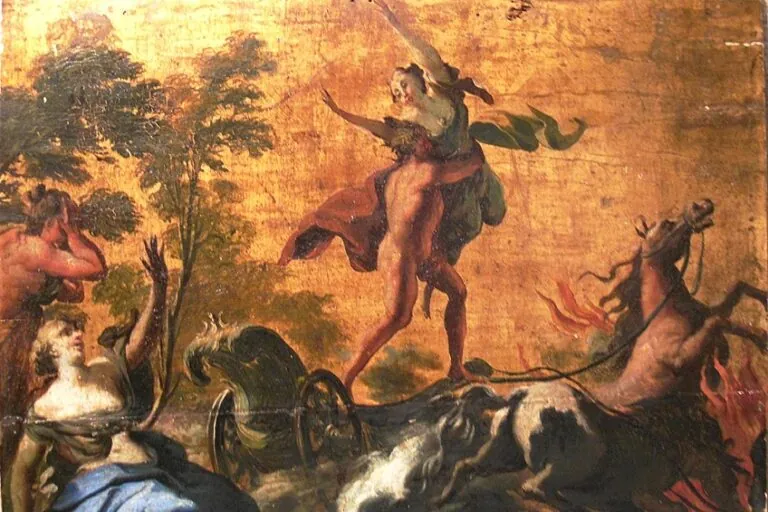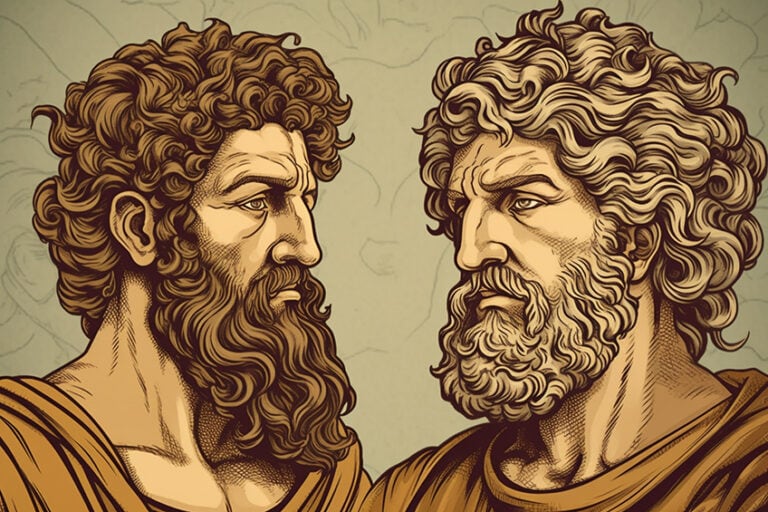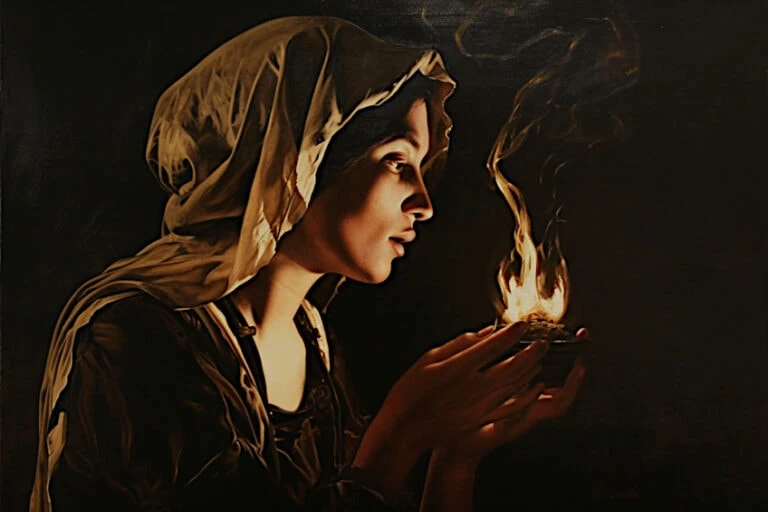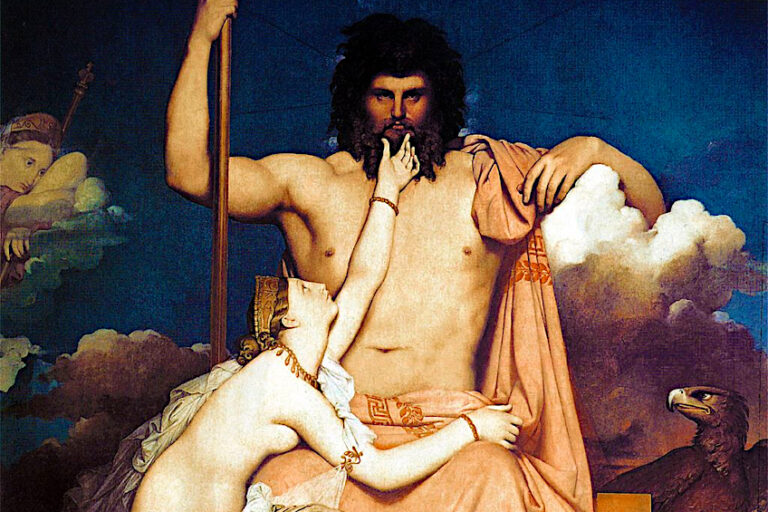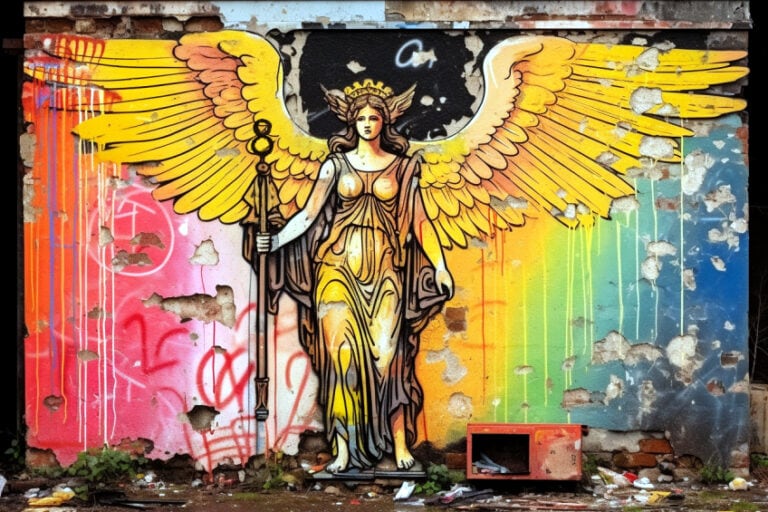Greek God Apollo – The Most Elegant of the Olympian Gods
What was Apollo known for, and what is Apollo the god of? In Greek mythology, the Greek god Apollo is classified as one of the major Olympian deities. He is regarded as the Greeks’ national divinity and is their god of dance and music, archery, prophecy and truth, disease and healing, poetry, and the sun. Let’s find out all the facts about Apollo and what he represented to the ancient Greeks, as well as learn more about Apollo’s symbols and deeds!
Contents
Everything You Need to Know About the Greek God Apollo
In Greek mythology, Apollo is the child of Leto and Zeus, and he has a twin sister, the goddess of the hunt, Artemis. He is considered to be one of the most prominent and multifaceted Greek divinities. Apollo is associated with healing and medicine, whether directly through him or through Asclepius, his son.
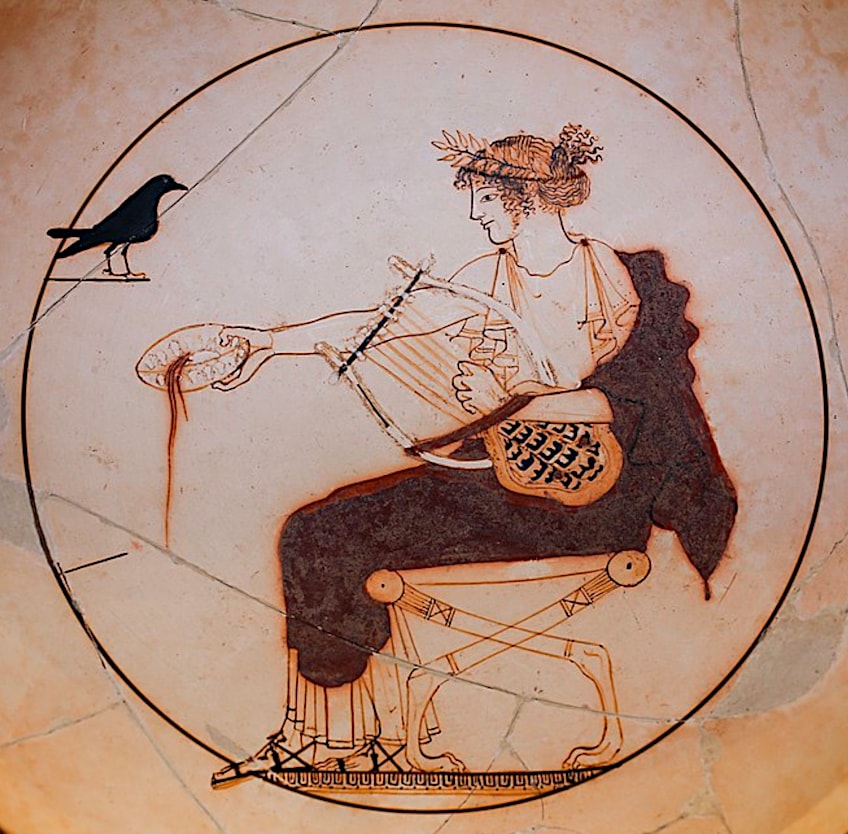 Attic white ground cup with depiction of Apollo pouring a libation (480 BCE); ArchaiOptix, CC BY-SA 4.0, via Wikimedia Commons
Attic white ground cup with depiction of Apollo pouring a libation (480 BCE); ArchaiOptix, CC BY-SA 4.0, via Wikimedia Commons
Apollo was the god to whom people prayed and sacrificed to save them from plagues, mainly because he also served as the deity who could bring disease and death with his arrows.
Apollo and Artemis are credited with inventing archery. Apollo is often depicted with a golden or silver bow and a set of golden or silver arrows. One of the most well-documented aspects of Apollo’s Panhellenic cult traits is his ability to help young people mature. Apollo, as a guardian of the youth, looks after the well-being and education of children. He also assists in their maturation into adults. Long hair, which was considered a boy’s prerogative until a certain age, was cut at the age of maturity and devoted to Apollo.
| God Name | Apollo |
| Gender | Male |
| Symbols | Bow and arrows, lyre, sword, laurel wreath, palm tree, hawk, crow, and the sun |
| Personality | Honorable, calm, and wise |
| Domains | Destiny, fate, speed, prophecy, healing, and death by disease |
| Parents | Zeus and Leto |
| Children | Asclepius, Corybantes, Aristaeus, Hymenaeus, Amphiaraus, Apollonis, Anius, Apis, Eurydice, Cycnus, Hector, Lycomedes, Linus of Thrace, Melaneus, Melite, Mopsus, Miletus, Oaxes, Oncius, Troilus, Orpheus, Phemonoe, Philammon, Tenerus, and Trophonius |
The Mythology of the Greek God Apollo
Apollo features regularly in Greek mythology, dramas, and songs. Apollo, the favorite child of Zeus, had unlimited access to Zeus’ mind and was eager to share this knowledge with humans. Apollo manifests as both a benevolent and a vengeful god, a deity far beyond the comprehension of humanity.
The Stories of Apollo in Greek Mythology
Zeus is considered the king of the Greek pantheon of gods, and Leto is either his previous wife or perhaps one of his mistresses. Apollo was raised by the nymphs Aletheia and Korythalia, who represented truth. When Zeus’ wife Hera found out that Leto was expecting Zeus’ child, she forbade her from giving birth on solid ground. Leto sought refuge in various places, only to be turned away.
In the end, the unborn Apollo’s voice told his mother of a floating island called Delos, which was the island that Leto’s sister, Asteria, had transformed into when she was trying to escape from Zeus.
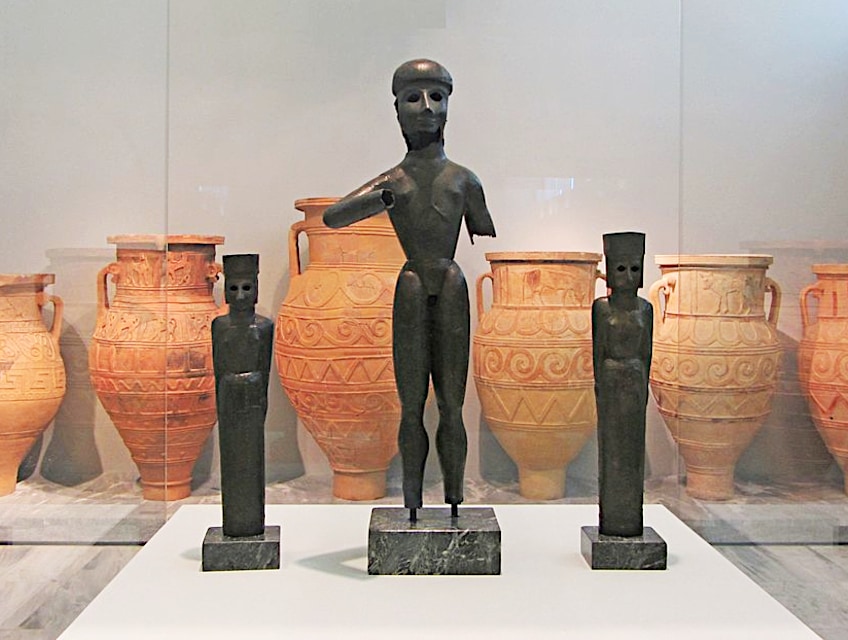 Earliest known hammered bronze figures depicting Artemis, Apollo, and Leto, also called the Apollonian Triad (c. 750 BCE); Stefan Bellini, CC0, via Wikimedia Commons
Earliest known hammered bronze figures depicting Artemis, Apollo, and Leto, also called the Apollonian Triad (c. 750 BCE); Stefan Bellini, CC0, via Wikimedia Commons
The Birth of the Greek God Apollo
Leto received a warm reception on the floating island, as it was technically neither an island nor a mainland, before giving birth to her twins beneath the shade of a palm tree. Except for Hera, all of the goddesses were in attendance to watch the event take place. Hera is also said to have kidnapped the goddess of childbirth, Eileithyia, in order to stop Leto from giving birth. The other deities persuaded Hera into letting Eileithyia go by presenting her with an 8-meter-long amber necklace.
Everything on the floating island turned to gold when Apollo was born, grasping a golden sword, and Delos was overflowing with the fragrance of ambrosia.
The nymphs all sang in joy as the swans encircled the floating island seven times. The goddesses that were present then bathed him clean before wrapping him in white linen and fastening golden bands around Apollo. Because Leto was not capable of feeding him, the goddess of divine law, Themis, fed Apollo nectar, also known as ambrosia. After eating the sacred meal, The young Apollo broke free from the cords that bound him and stated that he would be the god of archery and the lyre, as well as the messenger of Zeus’ will to humanity. Zeus, who had managed to calm Hera down, appeared and crowned Apollo with a golden headband.
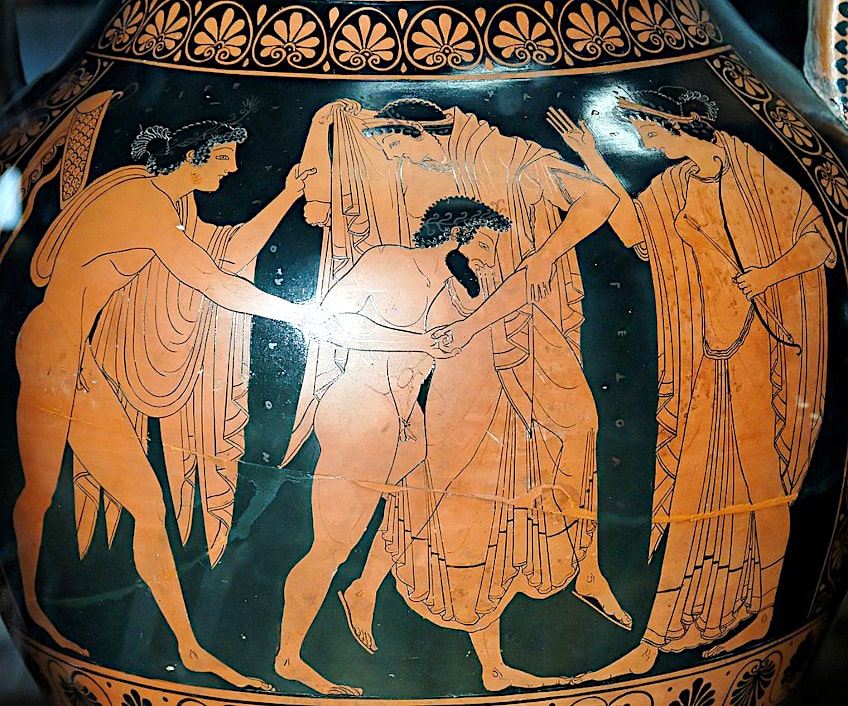 Attic red-figure amphora with a depiction of Apollo and Artemis defending Leto from an attack by Tityos (c. 515 BCE); Louvre Museum, Public domain, via Wikimedia Commons
Attic red-figure amphora with a depiction of Apollo and Artemis defending Leto from an attack by Tityos (c. 515 BCE); Louvre Museum, Public domain, via Wikimedia Commons
Hyperborea
Apollo was the most revered divinity of Hyperborea, the mysterious realm of endless spring. Leto is believed to have arrived on Delos with a wolf pack from Hyperborea. Apollo’s winter residence became Hyperborea, and wolves become sacred to him. But, as the deity who defended herds from predators, he was also known as the wolf-slayer. The most convincing proof of Apollo being worshiped as a solar deity can be found in the Hyperborean worship of Apollo.
Shamanistic characteristics in the cult of Apollo are often linked with his Hyperborean origins, and he is also thought to have begun as a solar shaman.
Shamans such as Aristeas and Abaris were also devotees of Apollo, who were also originally from Hyperborea. According to Greek mythology, the amber tears shed by Apollo when one of his sons, Asclepius, died turned into the river Eridanos, which encircled Hyperborea. Apollo also concealed the arrow he fired when he killed the Cyclops in Hyperborea and later gave Abaris this arrow.
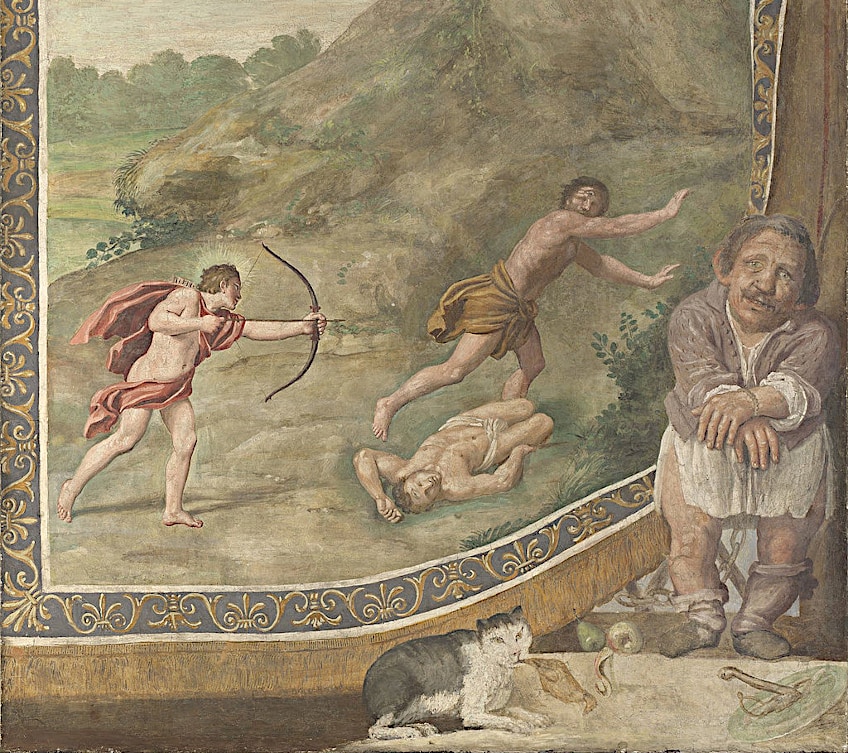 Detail from Apollo killing the Cyclops by Domenichino and workshop (from 1616 to 1618); Domenichino and workshop, Public domain, via Wikimedia Commons
Detail from Apollo killing the Cyclops by Domenichino and workshop (from 1616 to 1618); Domenichino and workshop, Public domain, via Wikimedia Commons
Childhood Myths
Apollo is believed to have constructed an altar and a fountain on Delos as a child out of the goat horns collected by his sister Artemis during her hunts. He was widely considered the deity who assisted men in the construction of new cities after learning the art of construction as a child. Apollo was also given a golden chariot pulled by swans from Zeus. Apollo was raised by the bee nymphs known as Thriae, who instructed him and developed his prophetic abilities when he was younger and herded cows.
In some accounts Apollo, not Hermes, is credited with inventing the lyre. Alongside his twin sister Artemis, he is ascribed the invention of the art of archery. He subsequently instructed humanity how to treat illness and use a bow and arrow. His grandmother, Phoebe, gave Apollo the Delphi oracular shrine as a birthday present.
Themis encouraged him to become Delphi’s oracular voice from that moment onwards. But first Apollo had to defeat the dragon Python who lived at a nearby spring and also had the power to give oracles. As recompense, Apollo founded the Pythian games in the monster’s honor, and Apollo’s priestess at Delphi who entered a trance and communicated the god’s oracles was called the Pythia. The stadium where the Pythian games were held can still be seen at the archaeological site of Delphi.
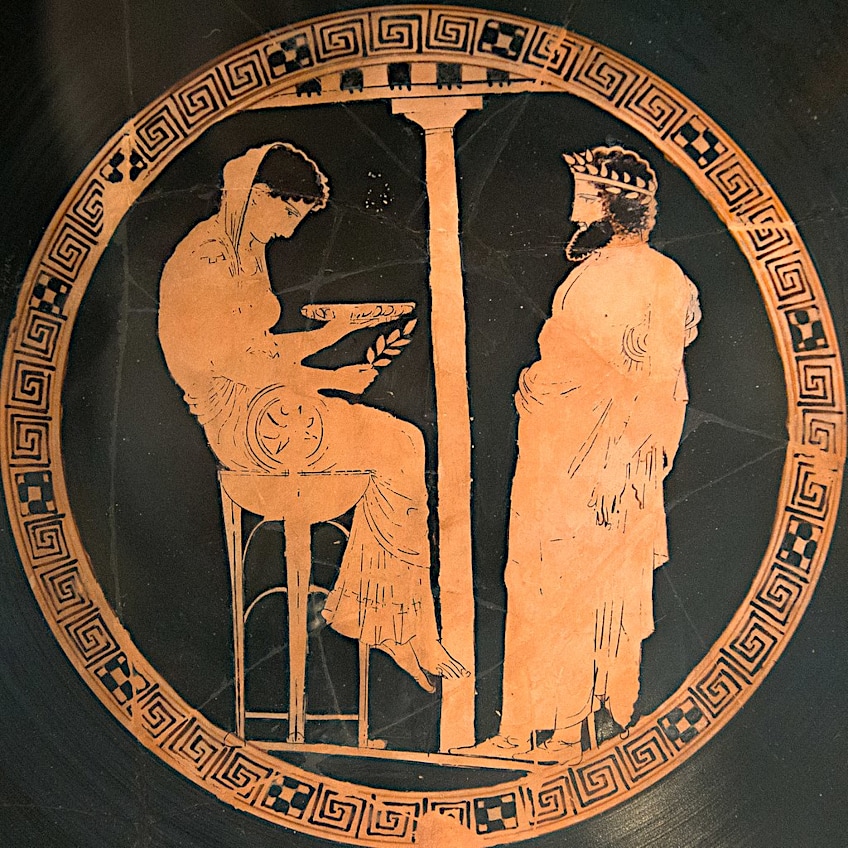 Attic red-figure kylix from Vulci depicting Apollo’s oracle, the Pythia of Delphi being consulted by king Aigeus (440-430 BCE); Zde, CC BY-SA 4.0, via Wikimedia Commons
Attic red-figure kylix from Vulci depicting Apollo’s oracle, the Pythia of Delphi being consulted by king Aigeus (440-430 BCE); Zde, CC BY-SA 4.0, via Wikimedia Commons
The Deeds of the Greek God Apollo
What was Apollo known for and what were his most famous deeds? Now that we know a bit more about Apollo’s origins and youth, we can find out more about the various deeds he undertook in life. Let’s begin with the story of Apollo and Python.
Apollo and Python
Python was a mythological serpent-dragon and the protector of the Delphic Oracle, whose demise was predicted by Apollo while he was still in his mother’s womb. According to most accounts of this story, Apollo was still an infant when he slaughtered Python. The serpent-dragon had been dispatched by Hera to kill Leto when she was still pregnant and had attacked her. As vengeance for the attack on his mother, Apollo went in pursuit of Python and slaughtered it in Delphi’s sacred cave with the arrows he had obtained from Hephaestus.
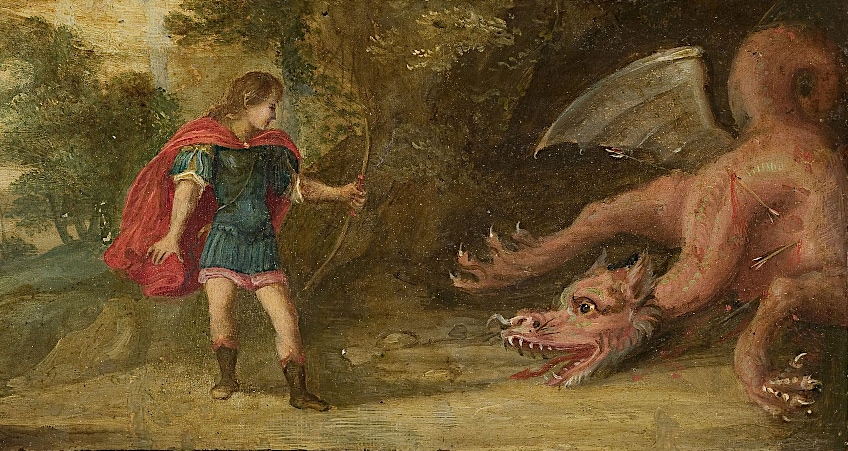 Apollo killing Python by an unknown artist (c. 1625); National Museum in Warsaw, Public domain, via Wikimedia Commons
Apollo killing Python by an unknown artist (c. 1625); National Museum in Warsaw, Public domain, via Wikimedia Commons
During the struggle, the Delphian nymphs who were present shouted words of encouragement to Apollo. They also offered him gifts and presented him with the Corycian cave after Apollo’s victory. According to the writer Homer, Apollo found and slew the Python while hunting for an appropriate place to build his shrine. Another account suggests that Python attacked Leto when she was in Delphi and that Apollo defended his mother by killing Python.
The Invention of the Lyre
The lyre was invented by either the Olympian god Hermes or Apollo himself. However, it has is is possible that Hermes invented a tortoise shell lyre, whilst Apollo produced the kithara-type lyre. According to one version of the myth, the infant Hermes kidnapped several of Apollo’s cows and led them to a cave near Pylos, concealing their tracks as he went. He discovered a tortoise in the cave and killed it before removing its insides. He constructed his lyre out of the tortoiseshell and cow’s intestines.
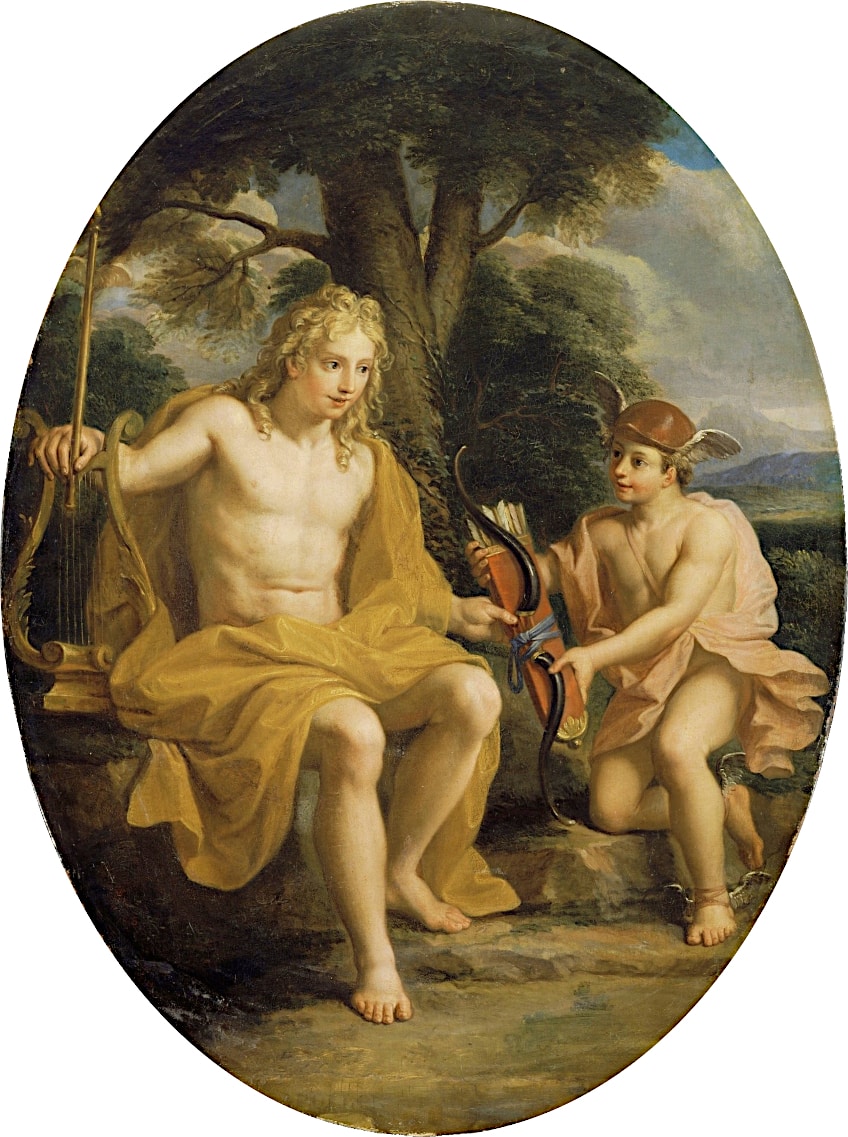 Story of Apollo – Apollo and Mercury (Hermes) by Noël Coypel (c. 1688); Noël Coypel, Public domain, via Wikimedia Commons
Story of Apollo – Apollo and Mercury (Hermes) by Noël Coypel (c. 1688); Noël Coypel, Public domain, via Wikimedia Commons
When Apollo realized that his cows had been stolen, he confronted Hermes and demanded that he bring back his livestock. When Hermes professed to be innocent, Apollo brought the subject before Zeus. After witnessing the events, Zeus agreed with Apollo and instructed Hermes to return the livestock. Hermes then proceeded to play music on his newly created lyre.
Apollo instantly fell in love with the instrument and offered to trade the cows for it. As a result, Apollo emerged as the master of the instrument. In other accounts of this story, Apollo constructed the lyre himself.
Apollo and Pan
Pan once had the arrogance of comparing his music to Apollo’s, challenging him to a musical contest. Tmolus, the mountain god, was chosen as the judge. Pan played on his pipes, bringing much pleasure to himself and his trustworthy servant, Midas. Then Apollo hit the strings of the lyre. Tmolus immediately awarded the win to Apollo because so sound of the strings was so exquisite. Everyone seemed pleased with the decision, except for Midas who objected and disputed the award’s fairness. Deeply offended by Midas’ lack of musical judgement, Apollo transformed the king’s ears into donkey’s ears.
In other versions of the myth Apollo competed against a satyr named Marsyas who had invented the double-flute and was so impressed with its sound that he boasted his music surpassed that of Apollo. When Marsyas lost he was flayed alive for his hubris.
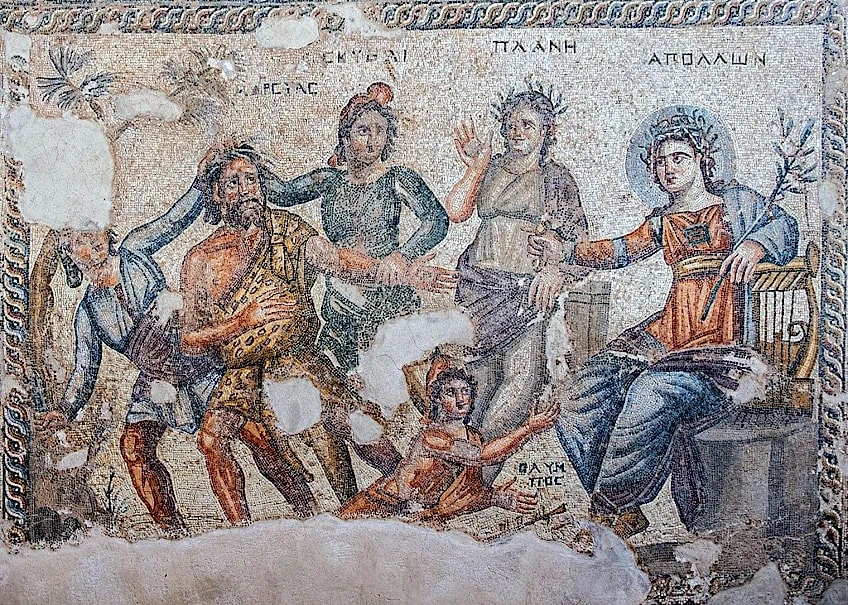 Mosaic depicting Apollo and Marsyas mosaic at the House of Aion in Cyprus (after 318 CE); Jules Verne Times Two / www.julesvernex2.com, CC BY-SA 4.0, via Wikimedia Commons
Mosaic depicting Apollo and Marsyas mosaic at the House of Aion in Cyprus (after 318 CE); Jules Verne Times Two / www.julesvernex2.com, CC BY-SA 4.0, via Wikimedia Commons
The Symbolism of Apollo
As with every divinity, there are certain symbols associated with the Greek God Apollo. What are these symbols and what do they signify in Greek culture and mythology? Let’s find out the significance and meaning of these symbols below.
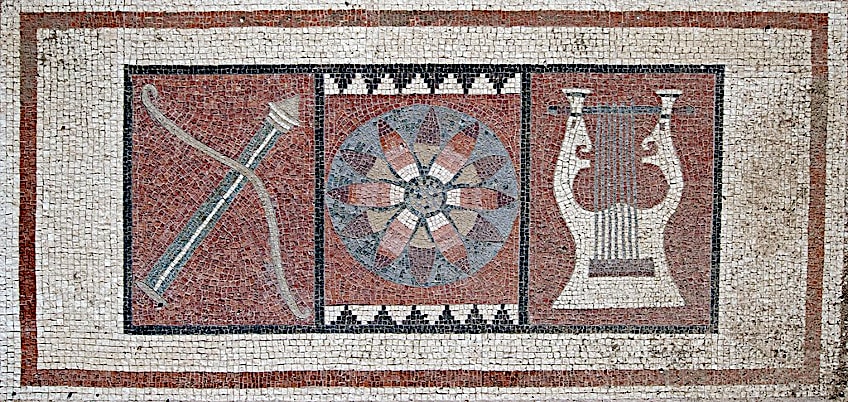 Mosaic depicting the attributes of Apollo from the Letoon temple; (2nd half of the 4th Century BCE); Dosseman, CC BY-SA 4.0, via Wikimedia Commons
Mosaic depicting the attributes of Apollo from the Letoon temple; (2nd half of the 4th Century BCE); Dosseman, CC BY-SA 4.0, via Wikimedia Commons
The Hawk
According to Porphyry and Homer, Apollo’s messenger was a hawk. In various stories, Apollo is reincarnated as a hawk. Furthermore, Claudius Aelianus claimed that in Ancient Egypt, folks thought that hawks were devoted to the Olympian and that Apollo’s ministers in Egypt said there were certain individuals known as “hawk-keepers” who fed and nurtured the god’s hawks.
According to Eusebius, the second sighting of the moon is considered holy in the Egyptian city of Apollo, and the city’s emblem is a human being with a hawklike visage (Horus). According to Claudius Aelianus, the Egyptians referred to Apollo as Horus in their own tongue.
The Golden Mean
The Golden Mean is often associated with Apollo. The Golden Mean is an ancient Greek philosophical concept. It was first proposed by Aristotle, who thought that the ideal way of leading a virtuous life is to stay away from extremes and strike a balance between two opposing and equally damaging vices. Courage, for instance, stands between the vices of fear and recklessness. In a similar vein, generosity is a virtue that exists between the vices of thriftiness and excess.
According to legend, inscribed on the temple of Apollo at his sanctuary in Delphi were the now famous words: “all things in moderation”.
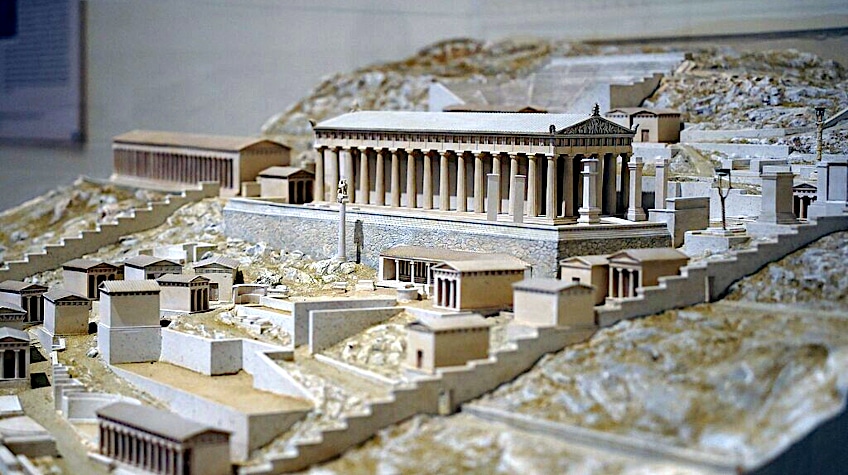 Reconstruction of Apollo’s temple at Delphi; TimeTravelRome, CC BY 2.0, via Wikimedia Commons
Reconstruction of Apollo’s temple at Delphi; TimeTravelRome, CC BY 2.0, via Wikimedia Commons
The secret to reaching joy and ethical excellence, argued Aristotle, is to locate the golden middle point between these polar opposite vices. Apollo was typically portrayed as an orderly and rational deity who appreciated harmony and stability. He was regarded as a proponent of moderation who despised extremes and excess. In this regard, Apollo represented the Golden Mean concept which emphasizes the significance of striking a balance between two extremes.
The Sun
The sun was regarded as the ultimate provider of heat and light in ancient Greek civilization and was thus associated with the concepts of knowledge and enlightenment. In a similar manner, Apollo was connected with the search for knowledge. Because it rose and set at regular times every day, the sun was considered a sign of order and consistency. In other realms of life, like poetry, music, and ethics, the Greek god Apollo was connected with harmony and equilibrium.
The sun was regarded as one of the most potent and vital heavenly bodies in ancient Greek society and was thus connected to one of the most important and prominent gods. While Apollo partook in solar symbolism, he was not the god of the sun though, that role belonged to Helios.
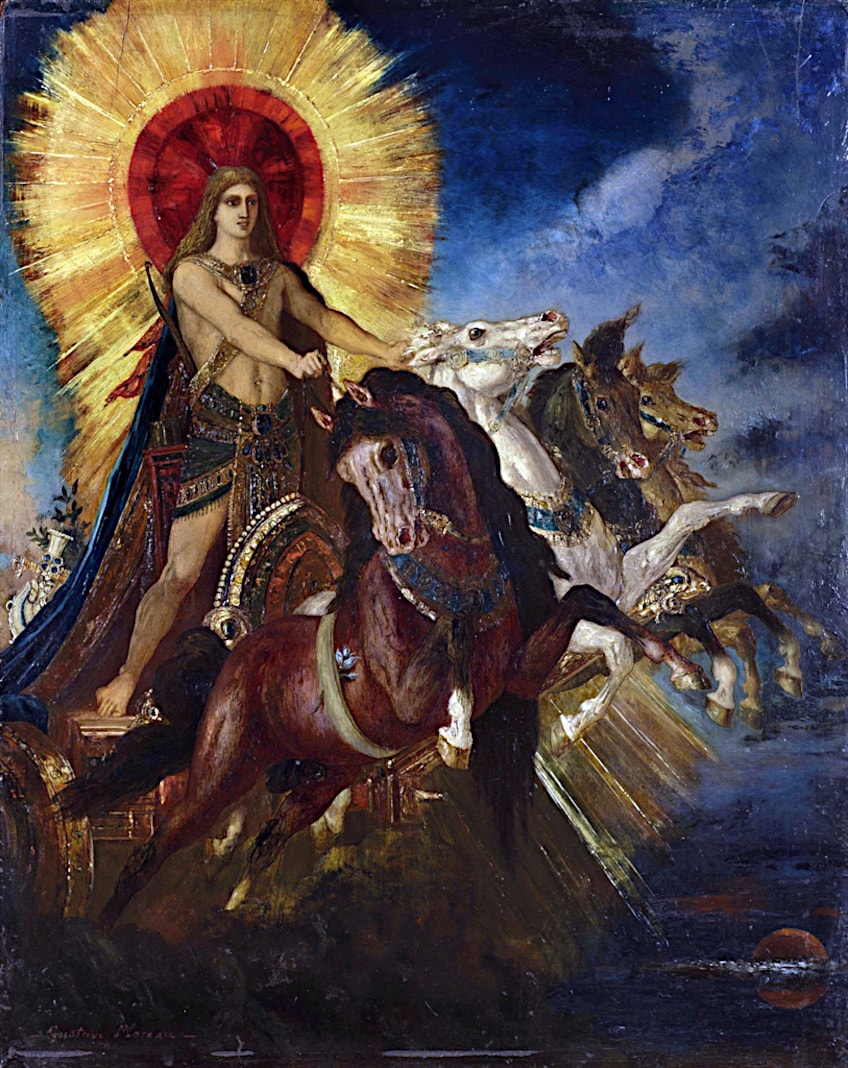 The Chariot of Apollo or Phoebus Apollo by Gustave Moreau (c. 1880); Gustave Moreau, Public domain, via Wikimedia Commons
The Chariot of Apollo or Phoebus Apollo by Gustave Moreau (c. 1880); Gustave Moreau, Public domain, via Wikimedia Commons
The Lyre
The lyre symbolizes Apollo’s role in the field of music. Apollo invented the paean, a song expressing victory or thanksgiving, shortly after his birth, and thus became the deity of music. He is the patron of singers, poets, and musicians since he is the divine singer. He is credited with inventing string music. Plato claimed that the intrinsic ability of people to enjoy rhythm, melody, and harmony was a gift from Apollo.
According to Socrates, the ancient Greeks thought that Apollo is the deity who controls harmony and causes all things to move in unison, both for the Olympians and for humanity.
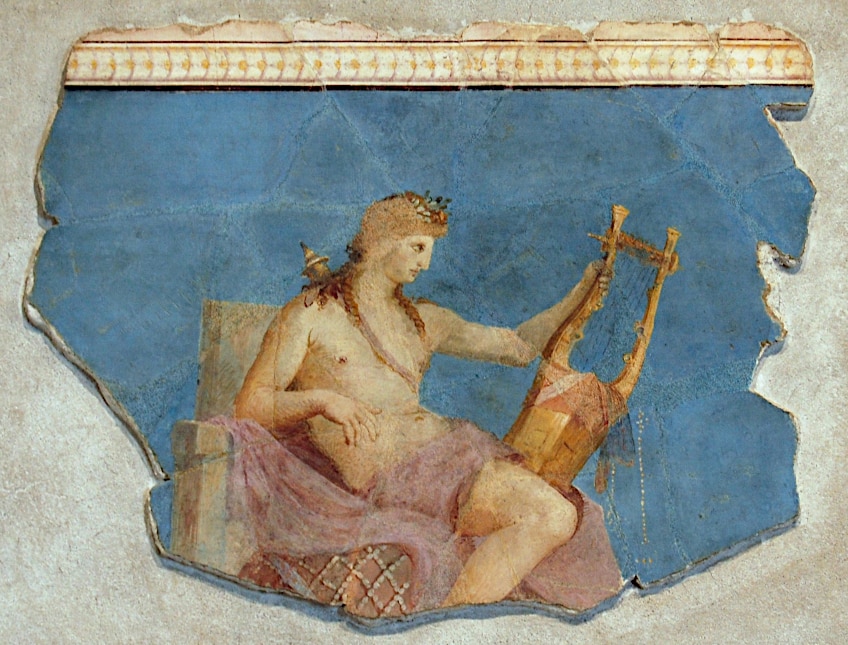 Fresco from the Scalae Caci on the Palatine Hill depicting Apollo as a Kithara-player (between c. 43 BCE – c. 18 CE); Cody escouade delta, Public domain, via Wikimedia Commons
Fresco from the Scalae Caci on the Palatine Hill depicting Apollo as a Kithara-player (between c. 43 BCE – c. 18 CE); Cody escouade delta, Public domain, via Wikimedia Commons
The study of music and mathematics was linked to the worship of Apollo, the major deity among the Pythagoreans. Their concept was that music purified the spirit in the same way that medicine cleanses the body. They also claimed that music was subject to the exact same mathematical principles of harmony as the physics of the universe, giving rise to the concept of the “music of the spheres”.
The Bow and Arrow
The bow and arrow were significant symbols of Apollo in ancient Greek mythology, as he often appeared with a bow and arrow and was considered to be an adept archer. Apollo was also linked with hunting, and in ancient Greek society, the bow and arrow were crucial hunting apparatus. Apollo was considered the embodiment of the skills required to be an adept hunter. Arrows and bows were emblems of authority and power in ancient Greece, especially when handled by a competent archer.
Apollo was regarded to be one of the most potent gods in the entire Greek pantheon, with the power to handle the bow and arrow with exceptional precision. Apollo’s arrows also brought death from disease to men, while women were believed to die from the arrows shot by Artemis.
Apollo in Art and Literature
Apollo is a common theme in Greco-Roman art, as well as Renaissance art. The greatest amount of power and elegance that can be imagined was bestowed upon Apollo by Greek artists and writers. Let’s find out more about how artists and writers portrayed Apollo through the ages.
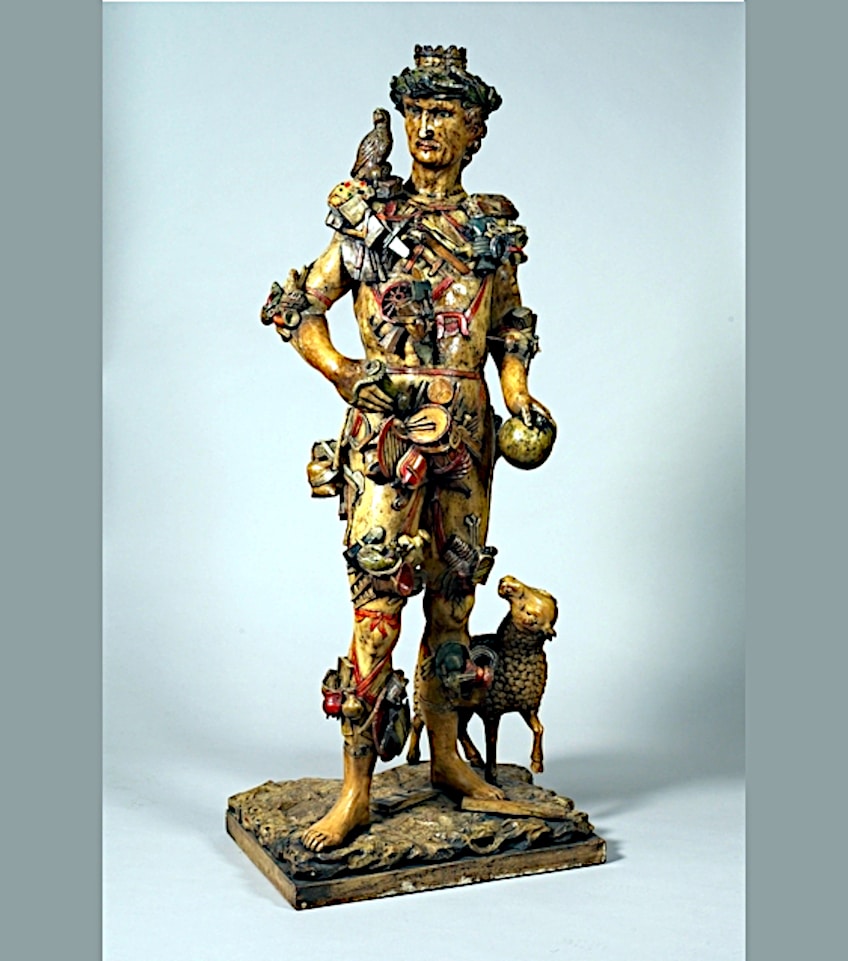 Polychrome wood sculpture depicting Apollo as the Genius of the Arts by an unknown artist (17th Century); Hunt Museum, Public domain, via Wikimedia Commons
Polychrome wood sculpture depicting Apollo as the Genius of the Arts by an unknown artist (17th Century); Hunt Museum, Public domain, via Wikimedia Commons
Apollo in Sculpture
The strong frames and limbs, along with slender waists, represent the Greek quest for health, as well as the muscular strength required in the harsh Greek climate. The ancient Greek statues of Apollo represented balance and beauty and inspired awe in those that witnessed them. Two figurines from the island of Delos’ Ionic sanctuary could represent the oldest instances of life-sized sculptures of Apollo. Such sculptures were discovered all across the Greek-speaking globe, with the majority of them discovered at Apollo’s sanctuaries, with over 100 found in the sanctuary of Apollo Ptoios, Boeotia alone.
The life-sized bronze statues of Apollo are far more rare. The magnificent sculpture, Piraeus Apollo, represents one of the few originals that remain intact to the present day, so uncommon that its discovery in 1959 was regarded as “a miracle” by Ernst Homann-Wedeking. It was discovered in Piraeus, a port city near Athens, and is thought to have originated in north-eastern Peloponnesus. It is the sole remaining large-scale Peloponnesian statue that has survived.
The well-known Apollo of Mantua and its various versions are the earliest examples of the Apollo Citharoedus type of statue, in which Apollo carries the cithara, an advanced seven-stringed lyre. While no original versions from Greece have survived, numerous Roman replicas from the late first or early second centuries exist, including the Apollo Barberini. The marble sculpture, the Apollo Belvedere, was unearthed in the late 15th century and for subsequent centuries, from the Renaissance to the 19th century, it represented the standards of Classical Antiquity for Europeans. The marble is a Roman or Hellenistic copy of a bronze original created between 350 and 325 BCE by the Greek sculptor Leochares.
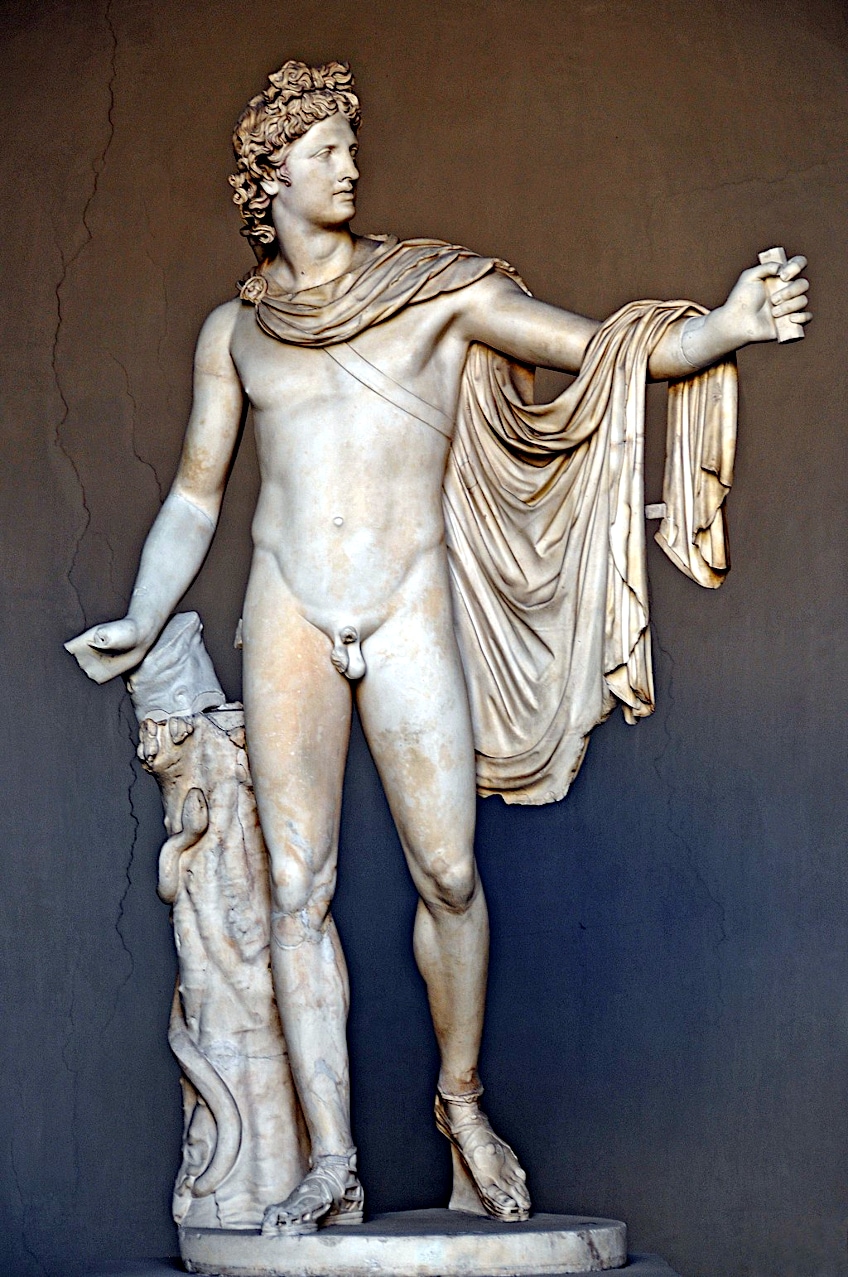
Apollo Belvedere (also called the Belvedere Apollo, Apollo of the Belvedere, or Pythian Apollo) (c. 120–140 CE); Dennis Jarvis from Halifax, Canada, CC BY-SA 2.0, via Wikimedia Commons
Apollo in Literature
Apollo was a well-known figure in ancient Greek literature, appearing in several works of drama, poetry, and philosophy. The Homeric Hymns are a collection of 33 songs attributed to Homer that were penned in the 7th or 6th centuries BCE. Many of these hymns pay tribute to Apollo, notably Hymn 3, in which Apollo is described as the deity of music and prophecy. The Iliad and Odyssey are two epic texts believed to be by Homer that mention Apollo multiple times.
In the Iliad, Apollo is enraged by the violent excesses of Achilles, the Greek hero, and aids the Trojans in his downfall. Apollo is referenced in the Odyssey as the father of the cyclops Polyphemus.
Aeschylus’s Oresteia trilogy, written in the fifth century BCE, features Apollo a great deal. Apollo is enraged with the character in the first play, Agamemnon, and unleashes a plague to punish him. Apollo appears as a character in The Libation Bearers and supports Orestes in plotting his retribution. In the final play, The Eumenides, Apollo appears at Orestes’ trial and advocates on his behalf. Callimachus’ Hymn to Apollo was written in the third century BCE and honors Apollo’s many skills and traits, such as his poetry, music, and healing powers.
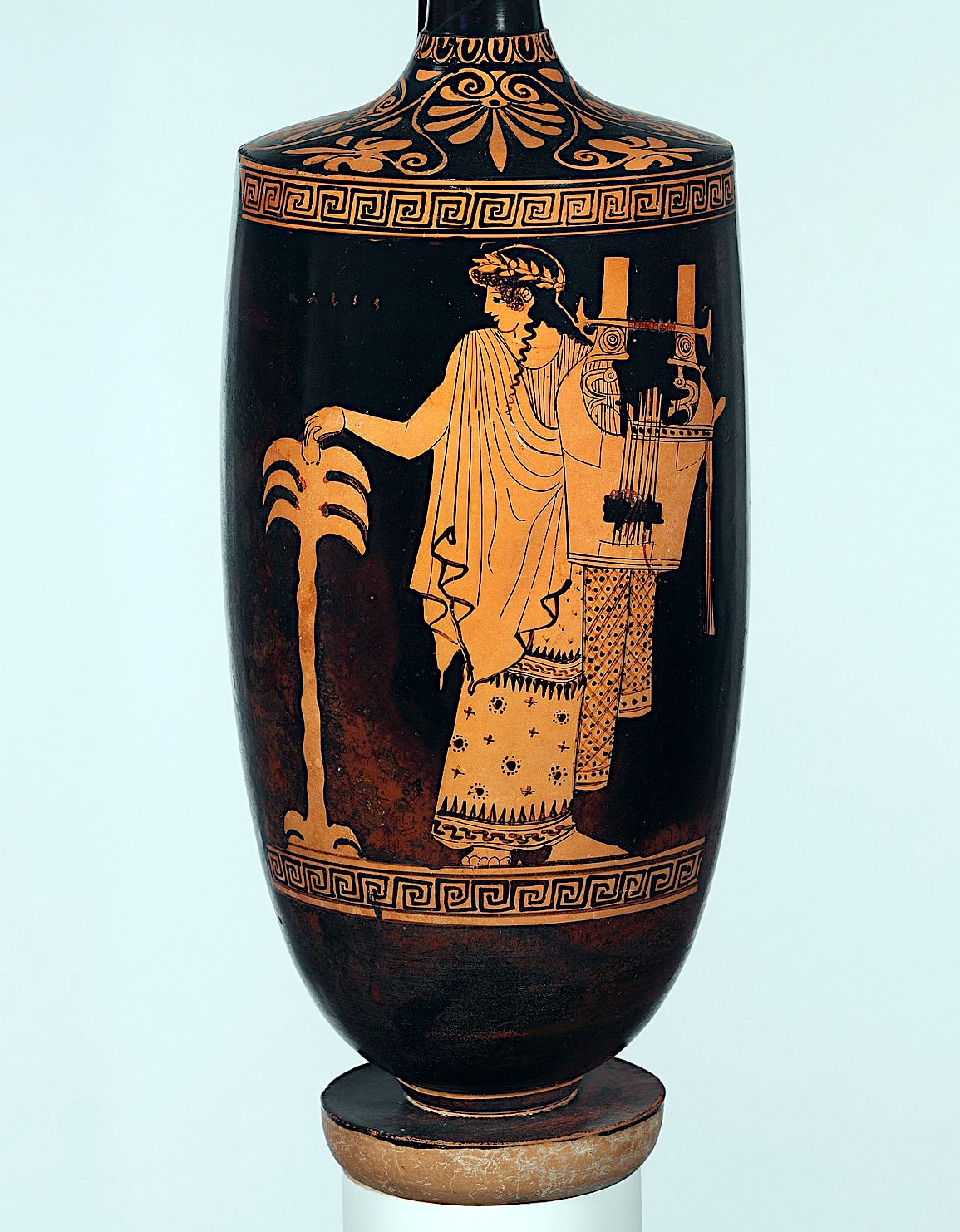 Oil flask depicting either Apollo or a musician with the Apollonic attributes of a kithara, laurel wreath and palm tree (460-450 BCE); Metropolitan Museum of Art, CC0, via Wikimedia Commons
Oil flask depicting either Apollo or a musician with the Apollonic attributes of a kithara, laurel wreath and palm tree (460-450 BCE); Metropolitan Museum of Art, CC0, via Wikimedia Commons
Plato’s Symposium, written in the fourth century BCE, is a philosophical dialogue that includes a speech by Phaedrus extolling Apollo as the deity of beauty and inspiration.
The Greek god Apollo was typically depicted in ancient Greek literature as a multifaceted figure. He had a connection to many domains, and depending on the setting of their work, writers employed Apollo’s image or persona for a variety of different objectives. Apollo was often depicted in epic poetry as a strong and, at times, a temperamental deity who could possibly meddle in human affairs at will. He was occasionally portrayed in dramatic literature as a righteous and intelligent deity who could guide humans to the correct path. Apollo was sometimes considered the messenger of rationality and inspiration in works of philosophy, embodying the ideal of a balanced and harmonious lifestyle.
Apollo in Modern Culture
We have discovered that Apollo was a very popular subject from the ancient Greco-Roman era right through the Renaissance era. How is Apollo viewed in the modern era, though? Is he a relic of the past or is he still relevant and discussed in our present time? Not surprisingly, due to being the deity of poetry, dance, and music the Greek god Apollo is still mentioned and referenced quite often.
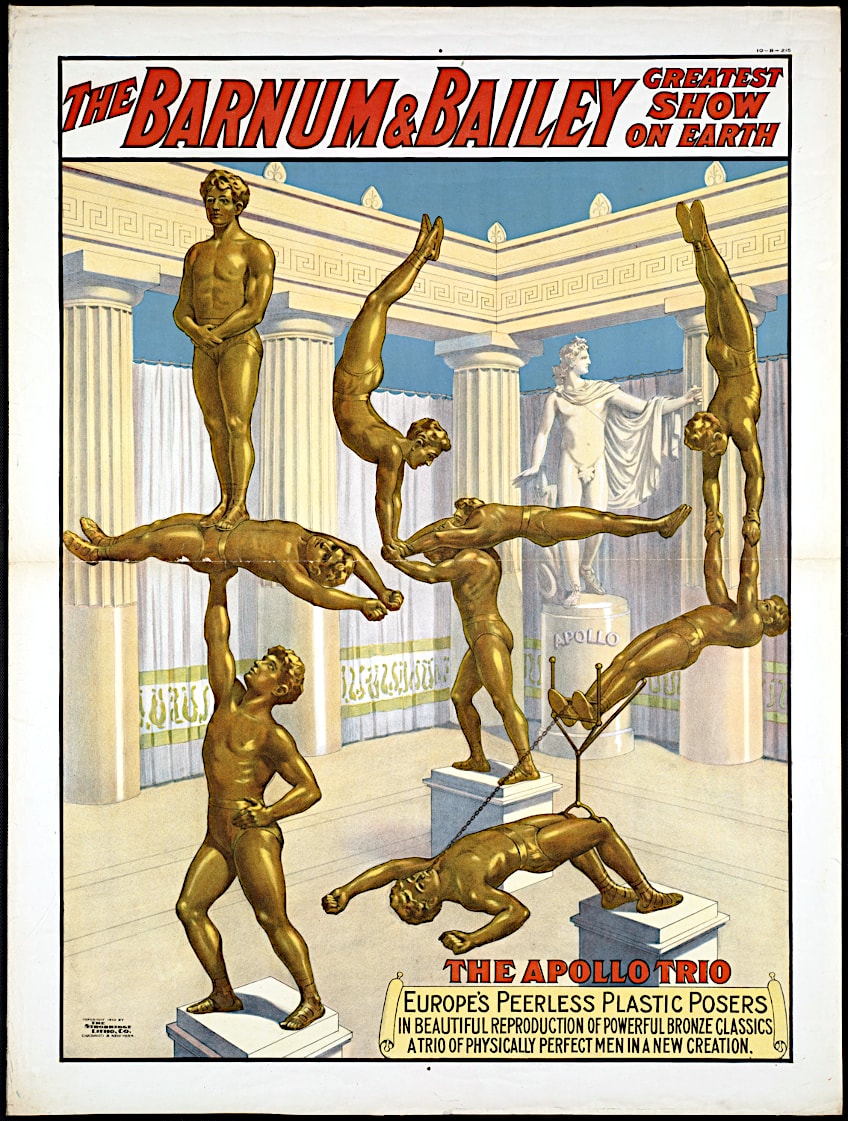 Poster advertising the Apollo trio who specialized in posing as Classical bronze sculptures at the Barnum & Bailey Circus (1910); Boston Public Library, CC BY 2.0, via Wikimedia Commons
Poster advertising the Apollo trio who specialized in posing as Classical bronze sculptures at the Barnum & Bailey Circus (1910); Boston Public Library, CC BY 2.0, via Wikimedia Commons
Apollo in Modern Music and Literature
People still associate Apollo with similar ideas in modern times as they did in the ancient and Renaissance eras. He is regarded as a symbol of originality, intellectualism, and artistic expression. He is also sometimes represented as a symbol of beauty, youth, and masculinity. The Greek god Apollo has been a popular subject in literature and music throughout human history, and he is still referenced often today. Apollo has been mentioned in a variety of musical genres, including rock, classical, and pop. Many poets, novelists, and playwrights have drawn inspiration from Apollo in their works.
In modern music, Percy Bysshe Shelley wrote a Hymn of Apollo in 1820, while Igor Stravinsky’s Apollon Musagète (1928) was inspired by Apollo’s instructions to the Muses. Rush, a Canadian rock progressive band, released an album containing the song Apollo: Bringer of Wisdom in 1978.
Apollo has been featured in modern literature, such as when Charles Handy utilizes Greek deities as a metaphor for representing various sorts of corporate culture in Gods of Management (1978). Apollo depicts a ‘role’ culture characterized by order, rationality, and bureaucracy.
Rick Riordan released the first book in the Trials of Apollo series in 2016, followed by four more volumes in 2017. The Apollonian and Dionysian drives are sometimes distinguished in the philosophical literature of the arts, with the former concerned with establishing logical order and the latter with uncontrolled creative thinking. Friedrich Nietzsche claimed that a synthesis of the two was preferable. Carl Jung’s Apollo archetype illustrates what he perceived as people’s proclivity to over-intellectualize while retaining emotional detachment.
The NASA Apollo Flights
When NASA announced that its endeavors to go back to the Moon would be known as the Artemis program, it sounded like an obvious choice. Earth’s natural satellite was widely identified with Artemis, the twin sister of Apollo, whose name adorned NASA’s first wave of lunar missions. But why did NASA choose the name Apollo to begin with? The names given to spaceflight missions and programs have come from a variety of sources and methods.
The agency’s official names have also been inspired by folklore, history, and even acronyms. However, Abe Silverstein chose the name Apollo for these flights. He was essential in constructing many of the integral structures of America’s first crewed missions, integrating his technical expertise with a wide vision of the future of space and aeronautics.
NASA had ambitious objectives by 1960. While actually landing on the Moon was not yet a possibility, and then-President John F. Kennedy would not propose it to Congress until 1961, the future expedition was nevertheless significant. It would at the very least reach the Moon’s orbit, initiating the next major phase of space exploration. Silverstein was ready with a suggestion for the flights: Apollo.
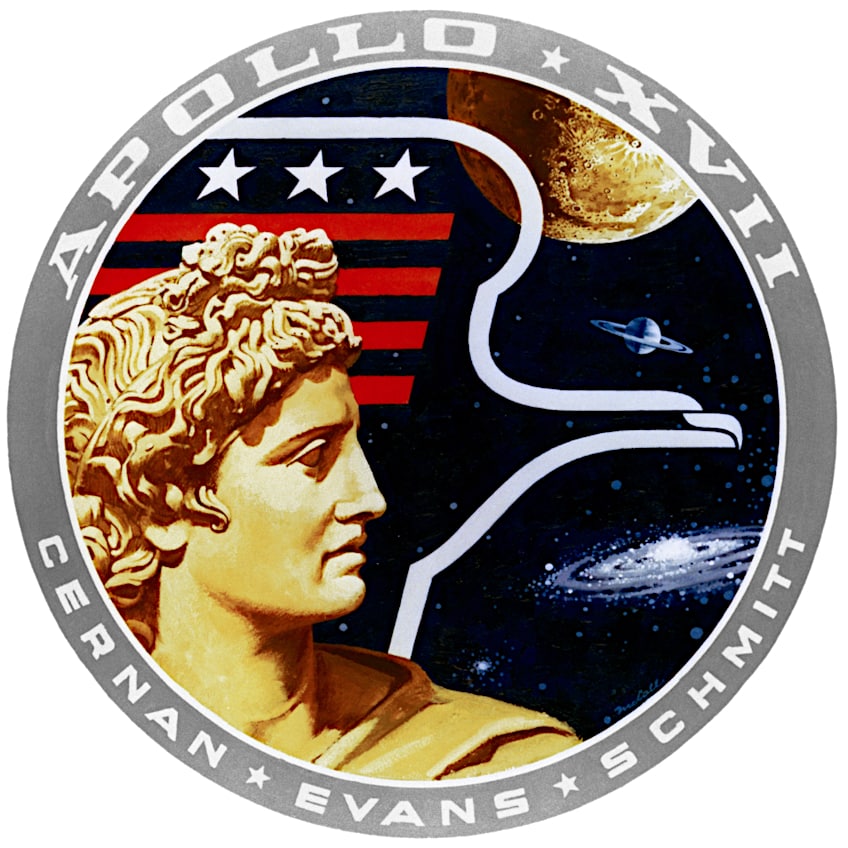 Official emblem of the Apollo 17 lunar landing mission (1972); Robert T. McCall/Apollo 17 astronauts, Public domain, via Wikimedia Commons
Official emblem of the Apollo 17 lunar landing mission (1972); Robert T. McCall/Apollo 17 astronauts, Public domain, via Wikimedia Commons
“Silverstein picked the name after browsing a volume on mythology one evening in 1960”, according to his NASA bio. He believed the idea of Apollo flying his chariot over the Sun was suitable given the program’s great magnitude.
Apollo played a prominent role in mythological astronomy as the sun god, so there was a strong connection between him and the idea of space and flight. Apollo symbolized space exploration perfectly. NASA later approved the name and made it official that summer. Notwithstanding a few obstacles and disappointments, Project Apollo was largely a success, landing humans on the surface of the Moon for the first time on the 20th of July, 1969.
Apollo in Popular Modern Media
Despite being a figure that was most prominent in the ancient world, the Greek god Apollo still continues to feature in popular modern media today. Keith David portrayed Apollo in Hercules (1997), the animated film. Apollo also featured in the action picture Clash of the Titans (2010), as well as in Percy Jackson & the Olympians: The Lightning Thief (2010). He has also appeared in a number of recent video games. He appears as a character in the action-adventure game God of War III (2010) when Peirithous uses his bow. He is also a playable character in Smite, an online multiplayer game. He also appeared as an antagonist in the webcomic Lore Olympus (2018) by Rachel Smythe.
That concludes this in-depth look at the facts about Apollo. While the Greeks had many deities, Apollo was regarded as one of the Olympians, the most significant deities of Greek mythology. His father was the great Zeus, considered to be the king of all the Olympian deities. He is also the twin of another notable Greek deity, Artemis. Many people throughout history revered this deity as he was regarded as the god of music, hunting, and poetry. Thanks to his association with these timeless endeavors, he continues to be referred to in the modern era, where he continues to be portrayed in contemporary media, such as films, books, video games, and music. He was so influential that even NASA’s flights to the moon in the 1960s were named after him!
Frequently Asked Questions
What Is Apollo the God of in Greek Mythology?
Apollo is the deity of numerous things in Greek mythology, particularly poetry, music prophecy, death by illness, and healing. He was the child of Zeus and Leto, as well as one of the 12 Olympians of the Greek pantheon. He often appeared as the deity of hunting and music, wielding his bow and arrows which he used to strike down those who displeased him or his family. Apollo was also associated with the Oracle of Delphi, where human beings gathered to seek his counsel and knowledge as the deity of prophecy. He was also recognized for his healing abilities, and many temples were constructed in his honor across ancient Greece.
What Was Apollo Known for in Greek Mythology?
Apollo symbolized many things to the ancient Greeks. He was known to be benevolent and calm, yet also considered vengeful if he or his loved ones were wronged. He was seen as both a deity associated with wolves, as well as a wolf hunter who protected his livestock. In some myths he is thought to be the inventor of the lyre (in other versions that honor belongs to Hermes) and is the Greek deity of poetry and music, closely associated with the Muses.

I am deeply passionate about history and am constantly fascinated by the rich and complex stories of the past. As the editor-in-chief of learning-history.com, I have the opportunity to share this passion with a wide audience through the creation and distribution of engaging and informative content about historical events, persons, and cultures. Whether it’s through writing articles and blog posts or creating videos or podcasts, I strive to bring the past to life in a way that is both accurate and enjoyable. My expertise in history, combined with my strong writing and communication skills, allows me to effectively communicate complex historical concepts and make them accessible and interesting to a wide range of readers. I am truly grateful for the opportunity to share my love of history with others through my work on learning-history.com.

